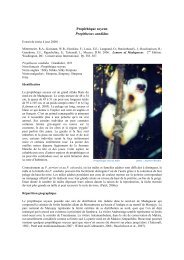A Traveler's Code of Ethics for Madagascar
A Traveler's Code of Ethics for Madagascar
A Traveler's Code of Ethics for Madagascar
You also want an ePaper? Increase the reach of your titles
YUMPU automatically turns print PDFs into web optimized ePapers that Google loves.
A TRAVELER’S<br />
CODE<br />
OF ETHICS<br />
FOR<br />
MADAGASCAR
The Traveler’s <strong>Code</strong> <strong>of</strong> <strong>Ethics</strong> was created by the travel agency Atalante, and was<br />
soon adopted by the Lonely Planet travel guides. Other partners associated with the<br />
Traveler’s <strong>Code</strong> <strong>of</strong> <strong>Ethics</strong> include the Mayor <strong>of</strong> Paris, the magazines Grands Reportages<br />
and Trek Magazine, and the brand name Aigle. Finally, a number <strong>of</strong> tour operators<br />
have supported the ef<strong>for</strong>t through the publication <strong>of</strong> the Traveler’s <strong>Code</strong> <strong>of</strong> <strong>Ethics</strong>.<br />
We reprint this <strong>Code</strong> <strong>of</strong> <strong>Ethics</strong> in much the same <strong>for</strong>m as it was originally written, but<br />
have adapted it in places by adding a few observations that we feel are unique to travel<br />
in <strong>Madagascar</strong>.<br />
A Traveler’s <strong>Code</strong> <strong>of</strong> <strong>Ethics</strong> <strong>for</strong> <strong>Madagascar</strong><br />
Two worlds meet every time a person travels from one country to another. We might be a<br />
traveler, a tourist, or an explorer, but we must never <strong>for</strong>get that we are always a guest. The<br />
countries that we visit are our host countries. It is this relationship between host and guest<br />
that can be so very delicate, and that can <strong>of</strong>ten make all the difference in whether our trip<br />
was enjoyable and a success – or not.<br />
There are many ways to travel and discover other places, but no matter how we go we<br />
invariably leave behind signs <strong>of</strong> our passage. These signs can be positive or negative. With<br />
each trip we learn a little more, but each place is different, and over and over again we face<br />
questions and doubts about how to act, about what is proper and what is not.<br />
Respect is Key to a Successful Visit<br />
This <strong>Code</strong> <strong>of</strong> <strong>Ethics</strong> is simply a collection <strong>of</strong> behaviors and attitudes that we would like to<br />
encourage in all travelers. Discovering other cultures without judging them, using common<br />
sense, and remembering some useful advise will result not only in a successful and pleasurable<br />
trip <strong>for</strong> you, but also in sustainable, positive development <strong>for</strong> <strong>Madagascar</strong>.
• One <strong>of</strong> the most appealing aspects <strong>of</strong> travel is in the diversity <strong>of</strong> people and cultures<br />
that one meets. Every culture, religion and lifestyle has rules and traditions which should<br />
be recognized and respected rather than judged. A successful trip requires respect and<br />
humility <strong>for</strong> the people and their way <strong>of</strong> life. This respect is expressed by simple, everyday<br />
attitudes and actions.<br />
• Every country lives according to it own rhythm. <strong>Madagascar</strong> is a land <strong>of</strong> «mora-<br />
mora,» where time takes on a slower meaning. Impatience and a rushed attitude will get you<br />
nowhere, and will in fact be counter-productive.<br />
• Keep your dress in line with local tradition. Wearing clothes that are too skimpy,<br />
tight, ostentatious, or sloppy will <strong>of</strong>fend some people. The same goes <strong>for</strong> body contact<br />
– <strong>for</strong> example, patting children on the head, pointing, and hugging in public.<br />
• A good photographer respects his or her subject. Take the time to establish a rapport<br />
with the people you wish to photograph. Ask their permission (ask the parents <strong>of</strong> children),<br />
and if they refuse, be gracious and accept their wishes.<br />
• Do not promise to mail photographs to people unless you are positive you can and<br />
will send them. You can have prints made from digital cameras in the larger cities, and your<br />
guide may be able to distribute the prints during his or her next visit.<br />
• To prevent the introduction or spread <strong>of</strong> disease, be sure to get all recommended<br />
vaccinations be<strong>for</strong>e you leave home. Equally important is to use the correct dosage <strong>of</strong><br />
anti-malarials when you are in the country. Overuse <strong>of</strong> malaria prophylactics can increase<br />
parasite resistance to the drugs, to the ultimate detriment <strong>of</strong> the local people.<br />
• Preventing mosquito bites remains the only completely effective method <strong>of</strong> preventing<br />
malaria. Put on more clothes at sundown (socks, long pants, long sleeves), and use mosquito<br />
repellent.<br />
• Sexual tourism is an attack on human dignity and is against the law. It does not always
esemble prostitution. Often travelers will return from some country or another raving<br />
about the «fantastic sexual freedom» <strong>of</strong> the people without realizing that it is motivated<br />
only by poverty. While some laws and local customs may seem permissive, be aware that<br />
child molestation is severely punished. Today, many <strong>for</strong>eigners languish in Malagasy prisons<br />
awaiting their release. In addition, the prevalence <strong>of</strong> AIDS in <strong>Madagascar</strong> is increasing<br />
rapidly. It is your responsibility to encourage sexual behavior that prevents the spread <strong>of</strong><br />
this disease (abstinence, fidelity, and using protection).<br />
• Homosexuality remains a relatively taboo subject in the Malagasy culture (even<br />
though a tradition <strong>of</strong> transvestites existed in the royal courts during the Merina Empire).<br />
We recommend being discrete in public and keeping your sex life in your hotel room.<br />
Money, Property and Food Have Different Values in Different Places<br />
• Many misunderstandings originate from differences in the standard <strong>of</strong> living between<br />
travelers and the people <strong>of</strong> the host country. To be welcomed in a village or a family<br />
may be a huge financial sacrifice <strong>for</strong> many local people. Everything that is <strong>of</strong>fered to<br />
the traveler – like everything the traveler <strong>of</strong>fers in return – must be measured in the local<br />
value. (Remember that the monthly income in <strong>Madagascar</strong> averages 20–30 euros – sadly<br />
inadequate to decently keep a family.)<br />
• Donations and gifts are not innocent gestures, but can sometimes have a condescending,<br />
contemptuous or misplaced connotation (<strong>for</strong> example, throwing coins or candies to children<br />
in order to make them go away). Giving presents and over-tipping relative to the local level<br />
<strong>of</strong> affluence can destabilize the local economy. Children who beg or get money <strong>for</strong> photos<br />
<strong>of</strong>ten are kept out <strong>of</strong> school and may earn more money than their father. This can lead<br />
to the disintegration <strong>of</strong> the traditional family structure (lack <strong>of</strong> respect <strong>for</strong> the father and<br />
family elders). Don’t hesitate to ask your guide about what level <strong>of</strong> giving is appropriate in<br />
any particular situation.<br />
• Gifts such as medicines can be dangerous if they are distributed to individuals<br />
indiscriminately. Hospitals and clinics, if they exist, can handle such items in a safer and
more equitable way.<br />
• Staying in <strong>for</strong>eign or government-run hotel chains does little to support the local<br />
economy. Using local hotels and other local services (transportation, guides, cooks, porters<br />
and housekeepers) will ensure that your money directly benefits the local people.<br />
• A camera or even just a pair <strong>of</strong> shoes may represent the equivalent <strong>of</strong> several months<br />
or years worth <strong>of</strong> income <strong>for</strong> many local people. Showing such things <strong>of</strong>f or treating them<br />
carelessly can be shocking to locals and can cause serious misunderstandings.<br />
• Bargaining is a cultural part <strong>of</strong> the Malagasy business tradition. Refusing to participate<br />
is <strong>of</strong>ten misinterpreted, and it can contribute to a rise in the cost <strong>of</strong> living. Remember that<br />
what might be a ridiculously low price <strong>for</strong> the traveler could be considered a significant sum<br />
<strong>for</strong> the person who receives it.<br />
• As a general rule, travelers should avoid the temptation to buy sacred or traditional<br />
objects that are part <strong>of</strong> the country’s cultural heritage from poor people. Always be very<br />
sure that the object was made with the sole purpose <strong>of</strong> being sold to tourists be<strong>for</strong>e you<br />
buy it.<br />
Leave Only Footprints, Take only Photos<br />
• A country’s natural and cultural wealth are <strong>of</strong>ten its main tourist attractions. Travelers<br />
have a responsibility to respect and safeguard the host country’s environment.<br />
• Travelers should never litter, and should leave behind as little garbage as possible.<br />
Always try to use biodegradable materials (wrappers, etc.) if possible. Non-biodegradable<br />
materials such as plastic bags and batteries should be brought home with you in your luggage<br />
if there are no recycling or safe disposal systems handy. (Battery disposal is a growing<br />
problem in <strong>Madagascar</strong>, where they are dumped indiscriminately, <strong>of</strong>ten in waterways and<br />
gardens.)
• Some garbage, such as cardboard and toilet paper, can easily be burned. Ask<br />
locally about waste management. In many places in <strong>Madagascar</strong>, plastic bottles, glass jars<br />
and wrappers can be left with the locals who reuse them as ornaments or <strong>for</strong> utilitarian<br />
purposes.<br />
• In many areas <strong>of</strong> <strong>Madagascar</strong>, de<strong>for</strong>estation is a major problem, and firewood is<br />
scarce. Whenever possible, gas or kerosene (paraffin) should be used <strong>for</strong> cooking. If wood<br />
must be used, utilize only dead wood found on the ground. Charcoal is made using green<br />
wood from live trees and is a very inefficient <strong>for</strong>m <strong>of</strong> fuel; its use should be limited only to<br />
those areas which have well-developed re<strong>for</strong>estation programs in place.<br />
• Some ecosystems, especially in National Parks, are fragile and must be treated with<br />
extra care: stay on paths and trails, avoid trampling vegetation, do not use motorized<br />
vehicles or drive <strong>of</strong>f-road, etc.<br />
• Wildlife viewing should never alter an animal’s natural behavior or disturb its daily<br />
life. Maintain a distance from the animal that it regards as safe, and avoid making loud<br />
noises. Feeding animals modifies their natural diet and can be harmful to them. When fed,<br />
lemurs can become aggressive and thieves. Never disturb reptiles (especially snakes), which<br />
dislike being handled.<br />
• Un<strong>for</strong>tunately, some guides, in an attempt to please tourists or gain better tips, do<br />
not respect wildlife viewing rules – sometimes feeding the animals, getting too close, or<br />
otherwise harassing them. It is your responsibility to firmly oppose this unacceptable<br />
behavior.<br />
• Avoid fishing in lakes or the ocean where fish are rare or endangered. If you’re an<br />
avid fisherman, adopt a policy <strong>of</strong> «catch and release.» Hunting is prohibited in many areas<br />
<strong>of</strong> <strong>Madagascar</strong>. There is no place in <strong>Madagascar</strong> <strong>for</strong> tourists who come to fill their freezers<br />
with fish fillets and duck meat. Bring a camera, not a gun.<br />
• It is important to respect the rules and regulations <strong>of</strong> the National Parks and
Reserves. Paying the entry or daily fees provides desperately needed money <strong>for</strong> conservation<br />
activities in these protected areas. Always ask <strong>for</strong> a receipt to assure the fees are not being<br />
misappropriated.<br />
• We strongly encourage travel to areas around National Parks as this can help<br />
distribute the benefits <strong>of</strong> ecotourism to the surrounding communities, thus helping the<br />
parks themselves. Un<strong>for</strong>tunately, many protected areas have not pr<strong>of</strong>ited from their <strong>of</strong>ficial<br />
designations.<br />
• The Convention <strong>for</strong> the International Treaty on Endangered Species (CITES),<br />
which protects more than 2,500 species <strong>of</strong> endangered animals and 340,000 species <strong>of</strong><br />
endangered plants, prohibits the trafficking <strong>of</strong> animal skins, ivory, coral, shells and scales.<br />
It also prohibits the exportation <strong>of</strong> exotic live animals and plants (a serious problem in<br />
<strong>Madagascar</strong>).<br />
• Clean water is becoming a rarer and rarer commodity. Use water judiciously and<br />
always avoid polluting it. Use biodegradable, phosphate-free detergents and soaps. Washing<br />
should always be done downstream from human habitation and well away from all drinking<br />
water sources.<br />
• Always obtain permission be<strong>for</strong>e using village wells or pumps. Do not wash anywhere<br />
near drinking water facilities, even if the local people do it.<br />
• A number <strong>of</strong> «fady» or taboos should be respected in all regions <strong>of</strong> <strong>Madagascar</strong>.<br />
These are really common sense and common courtesy. For local fady specific to each<br />
region, inquire <strong>of</strong> village elders.<br />
- Do not spit or relieve yourself on or near a tomb.<br />
- Do not argue in public. If a reprimand is necessary, do it in private.<br />
- Never hit a Malagasy. While this may seem like common sense, things can sometimes<br />
get out <strong>of</strong> control when the rum flows freely.<br />
- Always respect the requests <strong>of</strong> the «ray amandreny» (village elders).
A Final Note<br />
Travelers to <strong>Madagascar</strong> bring money, which is essential <strong>for</strong> the development <strong>of</strong> the country<br />
and which can do much good. But travelers, through their naïveté, can also do great harm<br />
to the country and its people. The solution to preventing this negative impact is simple:<br />
travelers should always make inquiries, learn about the people and the place, become<br />
in<strong>for</strong>med. We believe that no travelers are intentionally bad; they are only ignorant.<br />
We have worked many years to share our philosophy <strong>of</strong> travel with as many travelers and<br />
tourism pr<strong>of</strong>essionals as possible. There are many approaches to the issue and nothing is<br />
fixed in stone. However, we feel it is our obligation and duty to preserve the world’s cultural<br />
richness by conducting our work with respect and humility.<br />
<strong>Madagascar</strong> is a welcoming and friendly land. The Malagasy people<br />
love travelers from <strong>for</strong>eign countries and will go out <strong>of</strong> their way to help<br />
you. Listen to these people; listen to their stories and to their advice.<br />
They will help you to fit in, to avoid making cultural faux-pas, and<br />
they will open your eyes to a most remarkable and fabulous world – the<br />
world <strong>of</strong> <strong>Madagascar</strong>.






